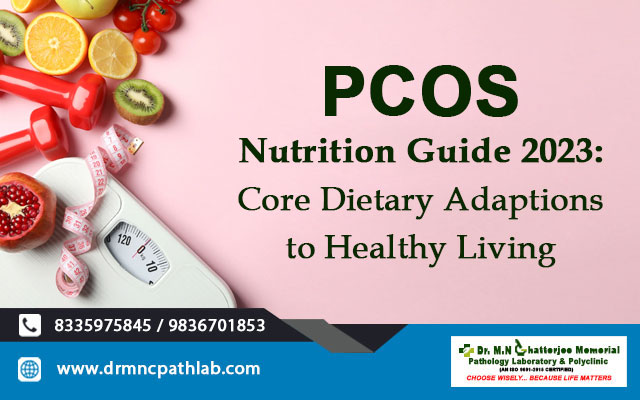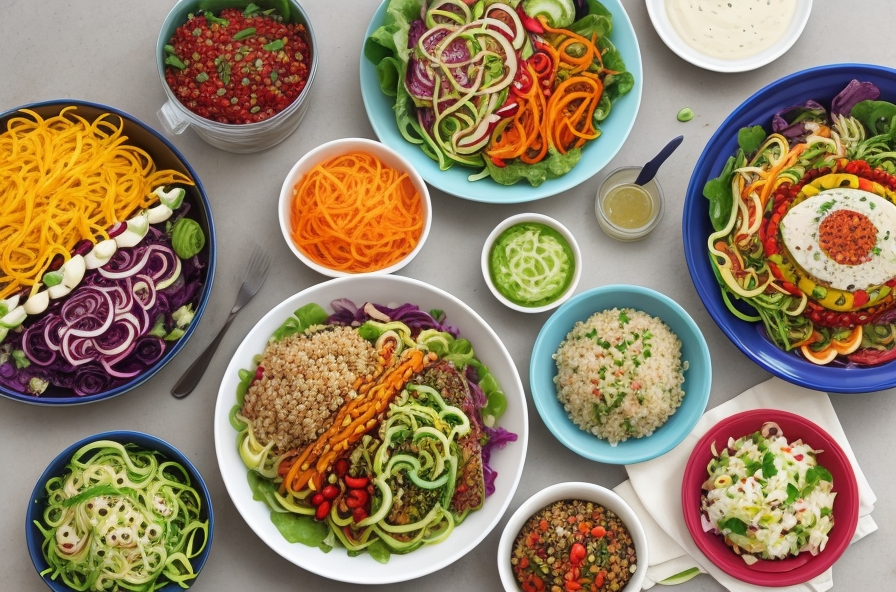Polycystic Ovary Syndrome, commonly known as PCOS, is a hormonal disorder that affects one in 10 women of childbearing age. From irregular periods to unwanted hair growth and acne, the symptoms can be quite challenging to manage. But did you know that a balanced diet can play a pivotal role in managing these symptoms? In this blog post, we’ll explore a variety of lunch ideas that are not just mouth-wateringly good but also packed with nutrients to help you manage PCOS better.
Table of Contents
Section 1: Why Diet Matters for PCOS
The food you eat doesn’t just fill your stomach; it can significantly influence your hormones and insulin levels, both of which are crucial factors when dealing with PCOS. Here’s why diet is so important:
- Insulin Resistance: Many women with PCOS have insulin resistance, meaning their cells don’t respond well to insulin. This can lead to elevated blood sugar levels, making it crucial to opt for foods that regulate insulin sensitivity.
- Hormonal Balance: Foods rich in certain nutrients can help balance hormones, reducing symptoms like irregular periods and acne. This article from WebMD offers more insight into how hormones are affected by PCOS.
- Weight Management: PCOS can make it easier to gain weight but harder to lose it. A balanced diet can assist in maintaining a healthy weight, which is beneficial for managing PCOS.
- Inflammation: Some foods are known to reduce inflammation, a common issue in women with PCOS. Anti-inflammatory foods can help manage symptoms.
- Mood Swings: Believe it or not, your diet can also affect your mood. Considering that PCOS is often linked with mood disorders like anxiety and depression, consuming mood-boosting foods can make a significant difference.
In summary, what you put on your plate is not to be taken lightly when you’re dealing with PCOS. The right foods can not only alleviate your symptoms but also improve your overall quality of life.
Section 2: Nutritional Guidelines for PCOS

While there’s no one-size-fits-all diet for PCOS, there are some general nutritional guidelines that can benefit most women dealing with this condition. Knowing what to eat and what to avoid can go a long way in managing your symptoms.
The Food Table: Good Choices vs Bad Choices
| Good Choices | Why They Help | Bad Choices | Why They Harm |
|---|---|---|---|
| Whole Grains | Low in Glycemic Index (GI) | White Bread | High in GI |
| Leafy Greens | High in Fiber and Nutrients | Sugary Snacks | Cause Blood Sugar Spikes |
| Lean Protein | Balances Hormones | Fried Foods | Increases Inflammation |
| Fatty Fish | Rich in Omega-3 | Soda | High Sugar Content |
| Berries | Low in Sugar | Fruit Juices | High in Sugar and Low in Fiber |
Breaking Down the Choices
- Whole Grains: Opt for whole grains like brown rice, quinoa, and whole grain bread as they are low in GI and can help regulate blood sugar levels.
- Leafy Greens: High in fiber and essential nutrients, leafy greens like spinach and kale are a must-add to your PCOS diet.
- Lean Protein: Sources like chicken, turkey, and fish can help balance hormones and are essential for muscle building and repair.
- Fatty Fish: Fish like salmon and mackerel are rich in Omega-3 fatty acids, which are known to reduce inflammation.
- Berries: Low in sugar and high in antioxidants, berries are a sweet way to nourish your body without affecting your insulin levels.
- White Bread: High in glycemic index, white bread can spike your blood sugar levels, worsening insulin resistance.
- Sugary Snacks: These are your enemy if you have PCOS. High sugar levels can disrupt hormone balance and lead to weight gain.
- Fried Foods: Not only are they high in calories, but fried foods can also increase inflammation, making PCOS symptoms worse.
- Soda: High in sugar and absolutely no nutrients, sodas can mess with your insulin levels significantly.
- Fruit Juices: While they may seem healthy, most fruit juices are high in sugar and low in fiber, making them a poor choice for managing PCOS.
By making more informed food choices, you can significantly influence how PCOS affects you on a daily basis.
Section 3: Lunch Ideas for PCOS

Eating well doesn’t mean you have to compromise on taste. Here are some delicious lunch ideas that can make your PCOS management journey not just effective but also enjoyable.
1. Salad Jars
Ingredients:
- Leafy greens (spinach, kale, arugula)
- Cherry tomatoes
- Cucumbers
- Walnuts
- Grilled chicken
- Olive oil
- Lemon juice
Steps:
- Layer the ingredients in a jar, starting with olive oil and lemon juice at the bottom.
- Add the harder veggies like cucumbers and cherry tomatoes.
- Next comes the grilled chicken and walnuts.
- Top it off with leafy greens.
- Seal the jar and store in the fridge until you’re ready to eat. Shake well before eating.
Why It’s Good for PCOS:
- Leafy greens: High in fiber and essential nutrients
- Walnuts: Rich in Omega-3 fatty acids, beneficial for reducing inflammation
- Grilled Chicken: Lean protein to help with hormone balance
2. Quinoa Bowl
Ingredients:
- Cooked quinoa
- Black beans
- Avocado slices
- Grilled vegetables (zucchini, bell peppers)
- Lime juice
- Salt and pepper to taste
Steps:
- Place cooked quinoa as the base in a bowl.
- Layer on the black beans and grilled veggies.
- Add avocado slices on top.
- Drizzle with lime juice, salt, and pepper before serving.
Why It’s Good for PCOS:
- Quinoa: Low-GI and high in protein
- Black Beans: Great for insulin sensitivity
- Avocado: Healthy fats to support hormone balance
3. Zoodle Stir-Fry
Ingredients:
- Zucchini noodles (Zoodles)
- Stir-fry vegetables (carrots, bell peppers)
- Tofu or shrimp
- Soy sauce
- Ginger and garlic paste
- Olive oil
Steps:
- Heat olive oil in a pan and sauté ginger and garlic paste until fragrant.
- Add in the stir-fry vegetables and cook until tender.
- Add the tofu or shrimp and cook until done.
- Finally, add the zoodles and soy sauce, stir well, and cook for another 3-4 minutes.
Why It’s Good for PCOS:
- Zoodles: A great low-carb alternative to regular noodles
- Tofu/Shrimp: Protein sources that are easy to digest
- Vegetables: Full of essential nutrients and fiber
These lunch ideas are not just tasty but are also tailored to nourish your body and manage PCOS symptoms.
Section 4: Tips for Meal Prepping
Meal prepping is a lifesaver, especially when you’re trying to stick to a PCOS-friendly diet. Here are some tips to make your meal prep process as smooth as possible:
- Plan Ahead: Spend some time at the beginning of the week to plan your meals. Make a list of all the ingredients you’ll need.
- Batch Cooking: Consider making large quantities of dishes that can be easily stored and reheated, like quinoa or grilled chicken. This saves you both time and effort during busy weekdays.
- Portion Control: Use portion-control containers to store your meals. This will not only help you stick to the right portions but also make grabbing lunch on-the-go super easy.
- Freeze It: Foods like soup or stir-fries can be made in large batches and frozen for later use. Just make sure to thaw them properly before reheating.
- Prep Veggies: Cut and store vegetables in clear containers so you can see what you have available. This not only saves time but also encourages you to add more veggies to your meals.
- Don’t Forget Snacks: While focusing on lunches, also consider preparing healthy snacks like veggie sticks, fruit slices, or yogurt. Having these ready to go will help you avoid reaching for unhealthy options.
- Invest in Quality Containers: Having a set of good-quality, leak-proof containers will make storing and transporting your meals much easier.
- Label Everything: It might seem a bit obsessive, but labeling your containers with the date and contents can save you from the sniff test and make it easier to keep track of your meals.
- Be Flexible: While it’s good to stick to a plan, it’s also essential to leave some room for flexibility. Sometimes you might crave something different, and that’s okay! The idea is to have healthy options readily available.
By incorporating these meal prep tips into your routine, you’re setting yourself up for success in managing your PCOS symptoms. Proper preparation makes sticking to a PCOS-friendly diet that much easier, ensuring that you have nutritious and delicious options available when you need them.
Conclusion
Managing PCOS is a multi-faceted approach that involves lifestyle changes, medication, and, importantly, a balanced diet. The food choices you make can significantly impact your symptoms and overall well-being. From managing insulin levels to controlling inflammation, the right diet is your ally in this journey.
We’ve gone through why diet matters for PCOS, looked at some nutritional guidelines, and even dived into some delicious lunch ideas. We’ve also discussed tips for meal prepping, so you have no excuse not to try these tasty, nutrient-packed lunches!
But remember, while diet plays a significant role in managing PCOS, it’s not a one-size-fits-all solution or a substitute for professional medical advice. Everyone’s body responds differently to different foods, so it’s crucial to consult with a healthcare provider for a personalized diet plan tailored to your needs.
So go ahead, try out these lunch ideas and take one more step towards a healthier, happier you. Your body—and your tastebuds—will thank you!
Check out the rest of the ‘Updated Ideas‘ site; there are some cool articles waiting for you! Fancy writing for us? Just give that contact button in the top right a tap. Cheers!

